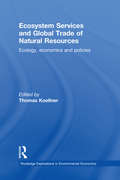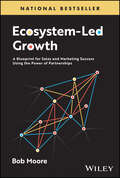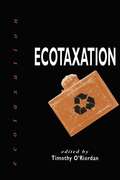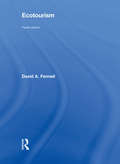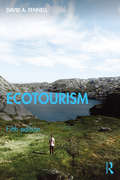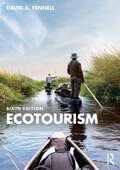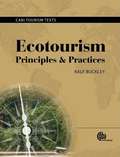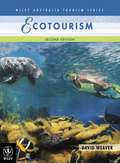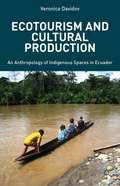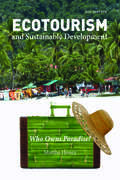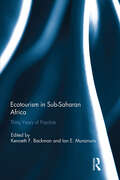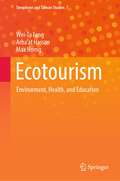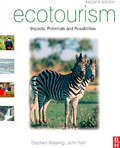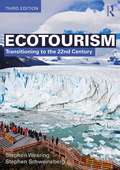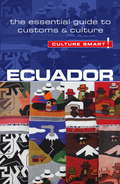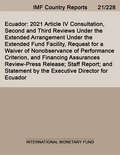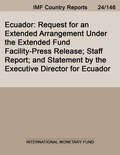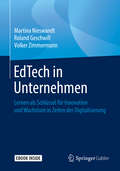- Table View
- List View
Ecosystem Services and Global Trade of Natural Resources: Ecology, Economics and Policies (Routledge Explorations In Environmental Economics Ser. #32)
by Thomas KoellnerThe utilization of natural resources to satisfy worldwide growing consumption of goods and services has severe ecological consequences. Aside from the projected doubling of food consumption in the next fifty years, the growing trade of biofuels and other commodities is a global challenge as the economic activities in the primary sector (i.e. mining, fisheries, aquaculture, forestry and agriculture) can damage biodiversity and ecosystem services. This should be taken into account in the decision-making affecting the global value chains linking consumer, retailer, processor, and producer in the North and the South. To cover the topic of ecosystem services and global trade this book is organized into four major parts. Part 1 gives the theoretical framework from an ecological, economic and political perspectives. Part 2 explores how internationally traded biophysical commodities from agriculture, forestry and fisheries translates into a virtual flow of land, freshwater, and marine ecosystems. Part 3 describes how two widely used accounting tools (i.e., Life Cycle Assessment and Green National Accounts) deal with international aspects of ecosystem services, and Part 4 shows how instruments like labelling, bans, or payments for ecosystem services in the private and public sector can influence trade patterns and the management of ecosystem services. This collection is a valuable contribution to the global change science dealing with ecosystem services. It illustrates the consequences of international trade on global ecosystem services and provides an overview of accounting tools and of market-based policy instruments to address negative and positive externalities. The book is certainly innovative, because it brings together research findings from distinct disciplines especially Industrial Ecology and Ecosystem Sciences, as well as Environmental Economics and Political Science.
Ecosystem Services: Economics and Policy (Palgrave Studies in Natural Resource Management)
by Stephen MuddimanThis book bridges the gap between economic and ecological theory and practice. Its main focus is on how the principles of the Austrian School of economics could improve the validity of Ecosystem Services.The concept of ‘Ecosystem Services’ is a relatively recent innovation in environmental thought. The current system is dependent upon mainstream economic theory, in which monetary and fiscal policy controls the prevailing health of the economy. The dependence on this approach to finance, Muddiman argues, limits the potential of ecosystem services and exacerbates the effects of the existing flawed economic model. The book highlights the links between ecological and economic methodologies and concepts and outlines how the principles of Austrian Economic theory could provide better environmental outcomes. It then goes on to formulate approaches to ecosystem services which could act as drivers towards a new biodiversity-based economic framework built around distributed ledger technology, or ‘blockchain’. The key distinction of this book is its consideration of ecosystem services as a function of the current economic system. Using this as a starting point it investigates how an alternative economic model would achieve the integration of environmental considerations into economic decision making.
Ecosystem-Led Growth: A Blueprint for Sales and Marketing Success Using the Power of Partnerships
by Bob MooreA blueprint to new levels of company growth leveraging your firm’s Partner Ecosystem In Ecosystem-Led Growth: A Blueprint For Sales and Marketing Success Using the Power of Partnerships, veteran entrepreneur and tech leader Bob Moore delivers an intuitive and insightful guide to using your company’s Partner Ecosystem to unlock countless leads, break sales records, scale your organization, and build a once-in-a-generation business. In the book, you’ll discover why partnerships are no longer the domain of “partner people” schmoozing at conferences. Instead, they can be used to unlock vast amounts of data, new relationships, and scalable growth plays. You’ll learn about: Transformational technologies that bring partner data to your fingertips Savvy companies and executives who convert that data into untapped growth opportunities Real-world examples of go-to-market leaders at dozens of leading tech companies implementing a powerful new perspective on growth An indispensable roadmap to an exciting new strategy for scaling your firm, Ecosystem-Led Growth will earn a place on the bookshelves of managers, executives, founders, entrepreneurs, salespeople, marketers, and anyone else interested in taking their company to new heights.
Ecotaxation
by Timothy O'RiordanEcotaxation covers two distinct ideas. To date, it has largely been associated with the 'polluter pays' principle, in the form of correctional charges imposed on activities which have a demonstrably damaging effect on the quality of life or the environment. The other involves a more ambitious policy shift, aiming to put taxation onto a different basis, away from income and labour, and onto resource-depleting and environmentally damaging activities. By going further, and directing the additional revenue towards environmentally supportive and socially improving ends, it can be part of the fiscal basis for sustainable development. This volume explores the history of both ideas, but with more emphasis on the wider-ranging policy alternatives that ecotaxation represents. The contributors look at the mixed records of the correctional economic instruments which have been introduced, suggesting that unless they are integrated into a more comprehensive package of reforms, they are not likely to have much effect on the direction of an already unsustainable economy. On the other hand, taxation has the potential not only to stimulate sustainable forms of economic activity but also, by lowering the costs of work and employment, to create jobs and greater social justice. At a time when governments' room for manoeuvre is being more and more restricted by conflicting social, economic and environmental commitments and pressures, revenue-neutral ecotaxation has a crucial role to play in reconciling those objectives and putting policy onto a new and lasting footing.
Ecotourism
by David A. FennellEcotourism continues to be embraced as the antithesis of mass tourism because of its promise of achieving sustainability through conservation mindedness, community development, education and learning, and the promotion of nature based activities that were sensitive to both ecological and social systems. The extent to which this promise has been realised is open to debate. Focusing on an array of economic, social and ecological inconsistencies that continue to plague ecotourism in theory and practice, the volume examines ecotourism in reference to other related forms of tourism, impacts, conservation, sustainability, education and interpretation, policy and governance, and the ethical imperative of ecotourism as these apply to the world’s greenest form of tourism. Ecotourism is a growing field attracting increasing attention from students and academics. Fennell provides an authoritative and comprehensive review of the most important issues that continue to both plague ecotourism and make it one of the most dynamic sectors in the tourism industry. It covers a comprehensive range of themes and geographical regions. Building on the success of prior editions, Ecotourism has been revised throughout to incorporate recent research and benefits from the introduction of real-life case studies and summaries of recent literature. An essential reference for those interested in Ecotourism, the book is accessible to students but retains the depth required for use by researchers and practitioners in the field. New chapters on the theory and application of animal ethics; community development in sustainable tourism; and education and learning in the field have added further value to an already very comprehensive volume. This book will be of interest to students across a range of disciplines including geography, economics, business, ethics, biology, and environmental studies.
Ecotourism
by David A. FennellThe new fifth edition of Ecotourism focuses on an array of economic, social and ecological inconsistencies that continue to plague ecotourism in theory and practice, and examines the sector in reference to other related forms of tourism, impacts, conservation, sustainability, education and interpretation, policy and governance, and the ethical imperative of ecotourism as these apply to the world&’s greenest form of tourism. Building on the success of prior editions, the text has been revised throughout to incorporate recent research, including ecotourism taking place in under-represented world regions. It includes new case studies on important themes in research and practice as well as learning objectives in each chapter. David Fennell provides an authoritative and comprehensive review of the most important issues, including climate change and UN Sustainable Development Goals. Ecotourism continues to be embraced as the antithesis of mass tourism because of its promise of achieving sustainability through conservation mindedness, community development, education and learning, and the promotion of nature-based activities that are sensitive to both ecological and social systems. The book debates to what extent this promise has been realised. An essential reference for those interested in ecotourism, the book is accessible to students, but retains the depth required for use by researchers and practitioners in the field. This book will be of interest to students across a range of disciplines including geography, economics, business, ethics, biology, and environmental studies.
Ecotourism
by David A. FennellThe new sixth edition of Ecotourism focuses on an array of economic, social and ecological inconsistencies that continue to plague ecotourism in theory and practice, and examines the sector in reference to other related forms of tourism, impacts, conservation, sustainability, education and interpretation, policy and governance, and the ethical imperative of ecotourism as these apply to the world’s greenest form of tourism.Building on the success of prior editions, the text has been revised throughout to incorporate recent research, including ecotourism taking place in underrepresented world regions. It includes new case studies on important themes in research and practice as well as learning objectives in each chapter. David A. Fennell provides an authoritative and comprehensive review of the most important issues, including climate change and UN Sustainable Development Goals. Ecotourism continues to be embraced as the antithesis of mass tourism because of its promise of achieving sustainability through conservation mindedness, community development, education and learning, and the promotion of nature-based activities that are sensitive to both ecological and social systems. The book debates to what extent this promise has been realised.An essential reference for those interested in ecotourism, the book is accessible to students, but retains the depth required for use by researchers and practitioners in the field. This book will be of interest to students across a range of disciplines including geography, economics, business, ethics, biology, and environmental studies.
Ecotourism
by Ralf BuckleyEcotourism is a useful concept, but not a very well defined one; it has been debated in theory and attempted in practice for nearly two decades. Its key goal is to reduce the net environmental impact of the tourism industry, via mechanisms including minimal impact management measures, education, community involvement, private conservation, contributions to public protected areas, expansion of ecotourism enterprises and mainstreaming of ecotourism principles. Focussing on fundamental ecotourism concepts, this broad-based textbook provides a basis for studies into environment-based tourism. It covers key topics such as the management, economics and potential environmental impacts both positive and negative of this popular and growing sector. Written for tourism students and an ideal resource for undergraduate courses, Ecotourism: Principles and Practices will also interest industry practitioners and researchers. Now you can access additional content items for this textbook. You can download pdfs of powerpoint slides as study aids and to assist in teaching the subject matter. This content is free to own and is available from Griffith University here
Ecotourism (Second Edition)
by David WeaverEcotourism, second edition has been thoroughly revised to reflect contemporary developments in ecotourism. Building on the strengths of the first edition, the text discusses the significance of ecotourism in the domestic and international tourism sector. Ecotourism origins, markets, venues and impacts form the basis of the first part of the book. Business aspects of ecotourism, external environments, organisations and policies are examined in the second part of the book, along with special environments and activities such as whale watching, islands, polar regions and indigenous territories. The management of ecotourism is covered comprehensively and is illustrated by extensive industry and destination examples derived mainly from the peer-reviewed literature. A highlight of the book is a regional survey of ecotourism that offers comparative insights into ecotourism in Australia, the South Pacific, Asia, Europe, the Americas and Africa. <p><p> Ecotourism is a high yield tourist category within the national tourism industry and issues such as site planning and development, operator obligations and best practices, strategic management and the role of indigenous communities have become crucial professional and industry considerations.
Ecotourism And Cultural Production
by Veronica DavidovEcotourism is a unique facet of globalization, promising the possibility of reconciling the juggernaut of development with ecological/cultural conservation. Davidov offers a comparative analysis of the issue using a case study of indigenous Kichwa people of Ecuador and their interactions with globalization and transnational systems.
Ecotourism and Sustainable Development, Second Edition: Who Owns Paradise?
by Martha HoneyEcotourism and Sustainable Development is the most comprehensive overview of worldwide ecotourism available today, showing how both the concept and the reality have evolved over more than twenty-five years. Here Martha Honey revisits six nations she profiled in the first edition--the Galapagos Islands, Costa Rica, Tanzania, Zanzibar, Kenya, and South Africa--and adds a fascinating new chapter on the United States. She examines the growth of ecotourism within each country's tourism strategy, its political system, and its changing economic policies. Her useful case studies highlight the economic and cultural impacts of expanding tourism on indigenous populations as well as on ecosystems.
Ecotourism in Sub-Saharan Africa: Thirty Years of Practice
by Kenneth F. Backman Ian E. MunanuraSince its first mention in the academic literature, ecotourism has been endorsed by NGOs and governments as the most environmentally sound and locally beneficial method of tourist development. Over the last thirty years sub-Saharan Africa has adopted ecotourism as the primary focus for tourism development; research into this has demonstrated mixed results. In this publication, we seek to explore the actual outcomes for African countries that have developed their tourism policy around the principals and values of ecotourism. The sheer scope and magnitude of the task means that a complete evaluation of ecotourism in Africa is impossible. Instead, included here are spot assessments of various aspects of ecotourism related to conservation, policy development, environment, governance, community and indigenous peoples in southern Africa. The studies cover a wide array of countries, including Botswana, Kenya, Tanzania, Uganda, Ghana, Zimbabwe, and South Africa. Though this is only the beginning of a needed long term evaluation of the positives and negatives of ecotourism, it provides a starting point from which to move forward. This book was originally published as a special issue of the Journal of Ecotourism.
Ecotourism: Environment, Health, and Education (Sinophone and Taiwan Studies #7)
by Wei-Ta Fang Arba'at Hassan Max HorngThis book bridges the gap on the critical issues of ecotourism and direct economic assistance to the conservation of local ecological and human resources. It covers various topics and case studies by ecotourism destination and ecotourism route from Sinophone and Taiwanese perspectives. Each chapter of this book includes comprehensive proposes as an important core value for planning and operating ecotourism. According to Sustainable Development Goals (SDGs), this book highlights our balanced understanding of sustainable tourism from the perspective of human ecology. Ecotourism needs to integrate the perspectives of population biology, bioanthropology, biomedicine, and public health and strengthen the connection between human ecology and disease. It is here to provide a comprehensive guide to all fascinating places for ecotourism courses. We encourage the following persons to read relevant chapters: (1) ecotourism entrepreneurs: business operators such as homestays, hot springs, ecological farms, and travel agencies; (2) ecotourism researchers: scholars and experts, university (specialized) college students, primary and secondary school teachers, and other ecotourism, environmental education, resource conservation, tourism and dining, leisure and recreation, other related fields researchers; and (3) ecotourism practice management and planners.
Ecotourism: Impacts, Potentials And Possibilities?
by Stephen Wearing John NeilEcotourism: Impacts, Potentials and Possibilities analyzes the impacts of mainstream tourism in first, second and third world countries, and argues the benefits of adopting the philosophical approaches of ecotourism to create a more sustainable tourism industry in every country around the world. Conservation and ecotourism issues are now at the forefront of public opinion. The decline of natural rainforests, loss of endangered species, global warming and land degradation have galvanized public support for conservation. Building on the success of the first edition, this text has been fully revised and updated to include: updated and new international case studies a new chapter devoted to the theory and technique of Rapid Rural Appraisal (the practice whereby communities are empowered to improve their own environment) questions and further readings at the end of each chapter to facilitate student's learning critical analysis of ecotourism explores the movement of ideas around post-modern approaches to the field. Using relevant case studies, Ecotourism examines the potential positive social and environmental benefits of ecotourism and is ideal for both students of tourism and practitioners within the tourism industry. Ecotourism will also be of interest to environmental groups, land managers, academics and planners.
Ecotourism: Transitioning to the 22nd Century
by Stephen Wearing Stephen SchweinsbergSince the first edition of the title, ecotourism has become a major phenomenon in tourism and society in many countries and regions throughout the world. The profusion of experiences has generated a variety of means of theorizing, analysing and marketing ecotourism, all that have yet to be encompassed in one book. Ecotourism fills the gap by synthesising the changes in thinking and society over the last decade. This third edition has been fully revised and updated to include: updated chapters addressing modern thought and discourse, including neoliberalism, consumer culture and quality management in the ecotourism industry; critical analysis drawn from a range of theoretical frameworks, which models and advances the thinking in ecotourism towards a socio-geographical analysis; new and international case studies from emerging markets such as China and Brazil. Providing a critical introduction to the analysis of tourism from a sociological and geographical perspective, the title is essential reading for higher-level and graduate students and researchers in tourism, sociology and geography. It will also be of interest to environmental groups and practitioners.
Ecuador - Culture Smart!
by Russell MaddicksSqueezed between Colombia in the north and Peru in the south, Ecuador is named for its location on the Equator and has a landscape so varied that it has been described as a microcosm of every microclimate found in South America. This diversity makes it a magnet for tourists, mountain trekkers, volunteers, and increasing numbers of US retirees looking for a warm, culturally interesting, economical, and safe place to spend much of their time. The country is booming, thanks to high oil prices and investment in tourism, and a massive infrastructure program and the poverty-reduction measures launched by President Rafael Correa have endeared him to the poorest in society. Ecuador's multiethnic population reflects a unique blend of cultures, from traditionally dressed mountain peoples, whose ancestors inhabited their highland villages before the arrival of the Incas, to the Afro-Ecuadorians of Esmeraldas and the Chota Valley and the tribal peoples of the Amazonian rainforest. The Ecuadorians are proud, friendly, hospitable, and hardworking, but to know them well the foreign visitor needs to understand the complex historical divisions between the highlands and the coast, and the rigid class and racial hierarchy that has shaped the country's history. Culture Smart! Ecuador takes you beyond the usual descriptions of where to go and what to see, and gives you an insider's view of the people, their history, their food, and their culture. Special sections are designed to help food lovers get the most out of the menu, assist business travelers to gain an edge on the competition, and show expats, volunteers, and visitors how to meet and get on well with the Ecuadorians, who are as diverse and varied as the country's amazing geography.
Ecuador: 2021 Article IV Consultation, Second and Third Reviews Under the Extended Arrangement Under the Extended Fund Facility, Request for a Waiver of Nonobservance of Performance Criterion, and Financing Assurances Review— Press Release; Staff Report; and Statement by the Executive Director for Ecuador (Imf Staff Country Reports)
by International Monetary FundA report from the International Monetary Fund.
Ecuador: Request For An Extended Arrangement Under The Extended Fund Facility-press Release; Staff Report; And Statement By The Executive Director For Ecuador (Imf Staff Country Reports)
by International Monetary Fund. Western Hemisphere Dept.A report from the International Monetary Fund.
Ecuador: Selected Issues Paper And Analytical Notes (Imf Staff Country Reports)
by International Monetary Fund. Western Hemisphere Dept.A report from the International Monetary Fund.
Ecuador: de Banana Republic a la no Republica
by Rafael CorreaEn este libro el lector encontrará una detallada exposición de los manejos que se le han dado a la economía ecuatoriana en los últimos años, y que explican la dificultad y complejidad de las circunstancias actuales. Aunque Rafael Correa no abandona en ningún momento el rigor y la seriedad propios de un texto académico, consigue una narración fluida y amena, en la que pone en evidencia la profundidad de su compromiso con el destino del pueblo ecuatoriano y de toda América Latina. Mediante una prosa cuidada, sencilla y con ejemplos ilustrativos, Rafael Correa ha explicado cómo el neoliberalismo ha sido una noche larga y triste en la historia de nuestros países. Su conclusión es que el continente americano requiere de políticas y de verdaderos empresarios que promuevan relaciones más justas entre capital y trabajo, es decir, un camino hacia el equilibrio social y la erradicación de la pobreza. "Ecuador jamás fue social ni económicamente un paraíso, pero lo que se hizo en las últimas décadas realmente no tiene nombre. De ahí el título Ecuador: de Banana Republic a la No República [...]. Aspiro a que este libro ayude a la verdadera liberación de nuestros pueblos, por medio del conocimiento y la comprensión de las barbaridades que se han hecho con nuestros países, y que sea un aporte más para nunca volver al pasado." Rafael Correa
Ed Sheeran: Unseen photographs of my time with Ed
by Christie Goodwin John Sheeran'...a fabulous book' Chris Evans (BBC Radio 2)A stunning collection of rare and unseen photographs and stories charting Ed Sheeran's rise to global superstar, by long-time collaborator Christie Goodwin.Featuring a foreword and additional photo captions by Ed's father, John Sheeran."When I first met Ed Sheeran he was unknown and unsigned - just a young busker trying to make it big. But I could see something special in Ed. I agreed to photograph him for free to help him on his way to the top. That was the beginning of a 10-year collaboration, with the two of us crossing paths as Ed became one of the biggest stars on the planet - a story told here, through my camera. Including images and stories I'm sharing for the first time, with additional captions by Ed's father John, this is an up-close and intimate view of Ed Sheeran."Christie Goodwin
EdTech in Unternehmen: Lernen als Schlüssel für Innovation und Wachstum in Zeiten der Digitalisierung
by Roland Geschwill Martina Nieswandt Volker ZimmermannIn diesem Buch finden Sie alles Wissenswerte zur EdTech für Ihr Unternehmen Das Buch „EdTech: Was Manager im digitalen Zeitalter über das Lernen wissen sollten“ beschäftigt sich damit, welche Lernkonzepte und Learning-Management-Systeme (LMS) zeitgemäß und zukunftsfähig sind und wie sich intelligente Bildung dauerhaft in Unternehmen etabliert lässt. Es richtet sich in erster Linie an: ManagerUnternehmerPersonalverantwortlicheLeiter von Digitalisierungsprojekten Sie lernen im Buch über EdTech (Educational Technology), wie Sie sich fit für die Zukunft machen können – insbesondere im Bereich des Bildungsmanagements, beispielsweise aber auch in der Organisationsberatung. Darüber hinaus schildern die Autoren Geschwill, Nieswandt und Zimmermann in ihrem Buch, wie sich Blended-Learning- und Online-Learning-Konzepte in Firmen konkret umsetzen lassen.
Eddie Bauer (A)
by Paul M. Healy Aldo Sesia Sharon KatzIn June 2005, Eddie Bauer, the specialty apparel retailer, emerged from bankruptcy. Under the plan of reorganization former creditors converted their debt into common shares, taking 100% ownership in the reconstituted company. Large banks -- including Bank of America and J.P. Morgan Chase -- were among the former creditors. In October 2005, Eddie Bauer stock was selling for $24 per share. Analysts were projecting target prices ranging from $22 to $35 per share. Account managers at Bank of America and J.P. Morgan Chase needed to assess whether to hold or sell their shares in Eddie Bauer.
Eddie Bauer, Inc.
by David E. Bell Ann LeamonEddie Bauer has decided to coordinate its merchandising strategy (price, selection) across its stores and catalog. But with e-commerce, is this still sensible?
Eddie Stobart: The Ultimate Guide to the British Trucking Legends
by Martin RoachFrom humble beginnings in a Cumbrian farmyard over forty years ago, the Eddie Stobart fleet has found a big parking place in the nation's heart, loved as much for its 2,200 immaculate green and red trucks, each emblazoned with a girl's name on the front, as for its famous army of dedicated Stobart Spotters who try to find each one.Buckle up with the Stobart drivers, and join them on a week in the life of a massive delivery, from paperwork to pallet. Learn what it's like to be sat in the driver seat of a Stobart truck - the noises, visibility, clutch control, gears, steering - and discover the sheer size and power of these machines.Illustrated throughout with amazing photographs, and featuring first-hand stories of incredible journeys from the intrepid truckers, as well as astonishing facts and stats and the history of the fleet, this is truly an irresistible book for Stobart fans of all ages.
